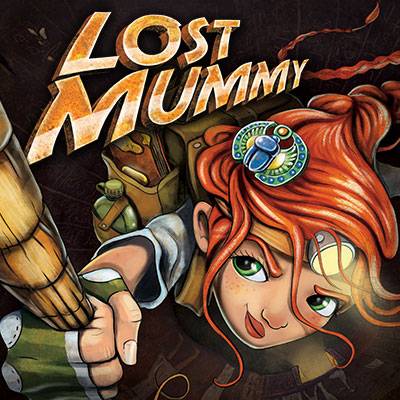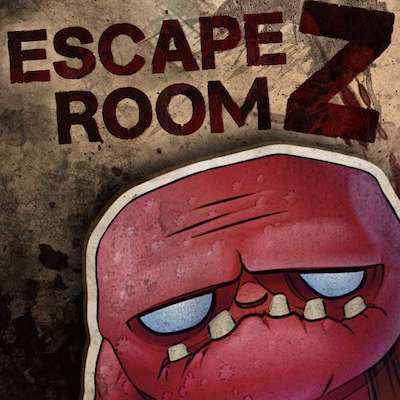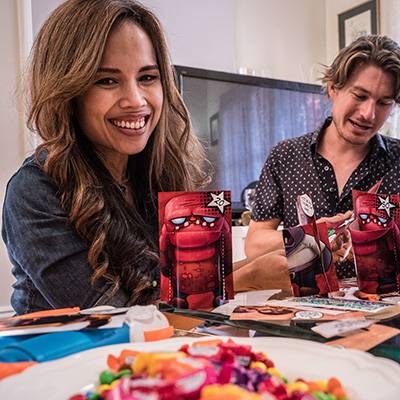#1 Incinerate Checking Mechanisms
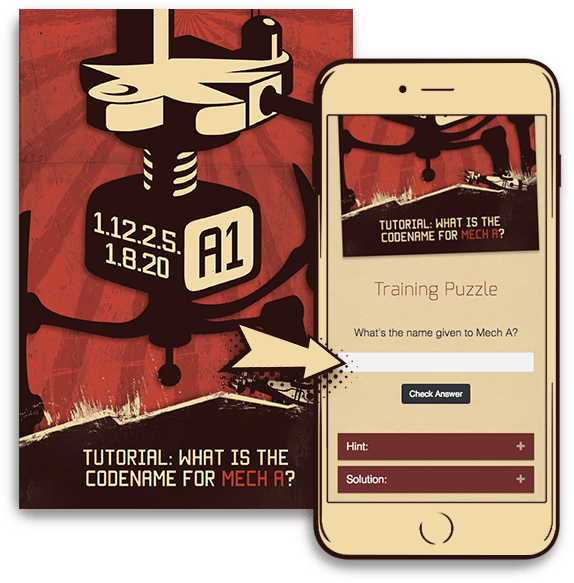
Rebel Revolt was one of the first games on the market and uses an online checking mechanism where players use their phone to 'see if they're correct'. You can see how the Q&A works here.
While the game is still a great party experience, it would be improved if players didn't have to stop interacting to check an answer.
Almost every DIY escape room kit on the market follows an annoying puzzle flow:
- Players try solving a challenge.
- They check their answers with some mechanism, like:
- Online answer box via app or website (one of my original games, Rebel Revolt, does this).
- Physical device (slide, rotate, align...)
- Turn-over two-sided cards and check if they're correct.
- Asking the organizer, or Game Master, who is running the event (like during a team building challenge).
- If they're correct, they're told to 'Go to the next part of the kit'.
This is like a road trip where you stop every 10 miles for gas. It breaks the whole experience.
Compare this to a real life escape room, when you're trying that magical 4 digit code in a padlock:
- You don't need to be told what type of answer you're trying to get.
- You don't have to 'ask' the padlock if it's the right code. You just enter it.
- You don't have to read a note instructing you to open the door and go through it. You just go through it.
Your escape room kit should aim to do this wherever possible.
This is hard. Super hard.
But absolutely worth it when crafting a best-in-class escape room box.
The solution? Include the checking mechanism in each puzzle:
This puzzle requires neither instructions nor checking mechanism. Instead, players logically link clues from another part of the game and know the moment they've succeeded. It's from the 4th game we published (The Lost Mummy), and since then we've been firebombing checking mechanisms.
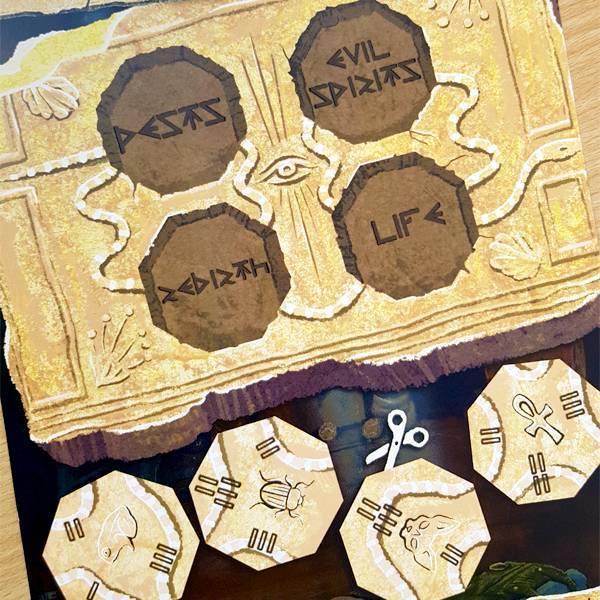
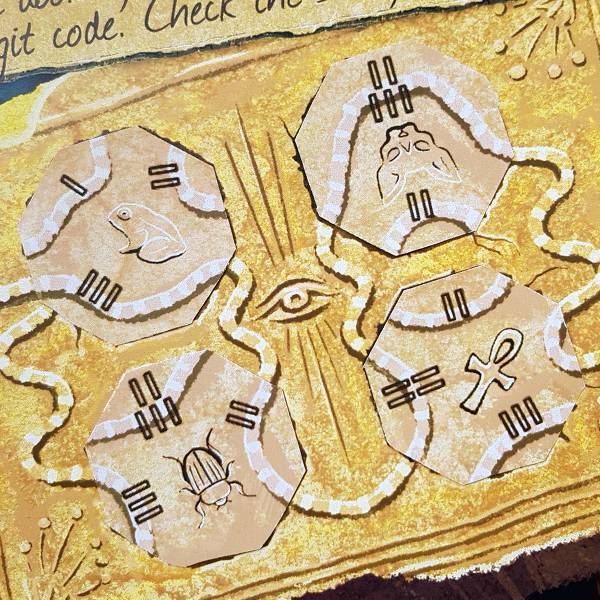
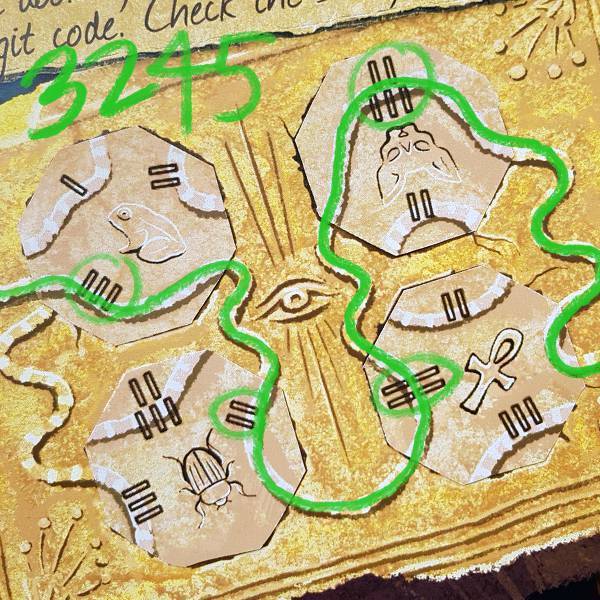
Even the 'good' example of above results in a 4 digit combination rather than intrinsically adding to a bigger puzzle. For example, spelling a word like OPEN, or making one letter in an acrostic word.
To do this well, you'll most likely need to design a major combination puzzle that requires several smaller challenges to be solved first. More on this in Secret 6.
Yes, it's hard, but 100% worth every painstaking hour invested into eliminating all checking mechanisms.
#2 Connect Escape Puzzle Elements
If you're trying to make players rage-quit in frustration, just get random unconnected puzzles and chuck them all in a room together. You'll be sure to succeed.
It forces players to simply run around guessing what goes with what.
This is the very definition of rage-quit.
For example, what would make a better clue location for players who need to open a toolbox?
- A scrap of paper in the bin, or
- Symbols scratched into the side of a hammer.
The hammer belongs in a toolbox, which will create an 'aha' moment once players make the logical connection.
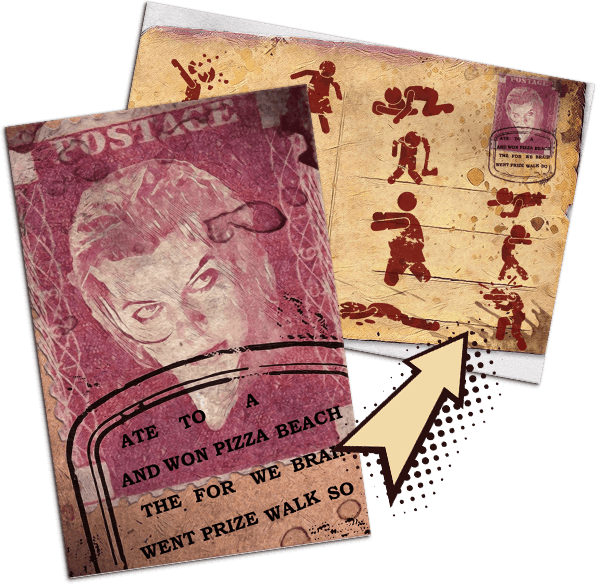
This puzzle from Escape Room Z logically connects 2 clues together.
Or, consider this puzzle from Escape Room Z. So long as players are observant, they'll notice the first clue card is, in fact, an enlarged version of the stamp on the postcard. 'Aha!'
This idea is critical for printable or boxed escape room kits since there's already minimal contextual understanding. It's very common for designers to just create 'floating puzzles' that don't really exist anywhere in a world. They're just puzzles on a page with no context.
Players just don't know where to start.
So don't do this. Just don't.
Some children have to escape more than just a room and they need your help.
#3 Show me, Don't tell me
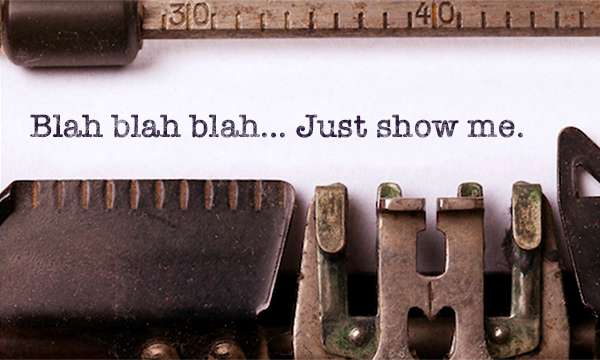
Every time a Game Master delivers a verbose intro a fun fairy dies somewhere...
But there's something even worse - reading an intro!
Reading during a game is boring. Sooooo boring.
So don't use words to describe the storyline, scene, goals, or puzzles.
One of the intro videos for the kids kit Rebel Revolt.
Instead, use images and videos:
- Describe the scene in your printable escape room with an image of the room, not bunch or text. Or make an intro video like in Rebel Revolt. You can still include a transcript, but make this optional (some players relish in-depth storylines, but don't force them to understand it in order to complete the game).
- Design puzzles that don't need explaining. Here's a big list and here's another.
- Make the goal of the room obvious, like a locked box or door, rather than telling them what they're trying to do.
As well as being more interesting, avoiding words has the added benefit of forcing you to logically connect puzzle elements in a way that makes sense.
Rule of thumb: Your game should have less than 1 minute of reading in total. That's all up. (Yes everything!)
2nd rule of thumb: Your game should take less than 1 minute to setup. Total.
Save time by starting with an editable DIY escape room kit
Save yourself the grunt work, when designing your DIY escape game by starting with one of these customizable kits.
They're 100% ready to print and party, and also come with the intuitive game editor so you can add puzzles, locks, boxes, and change whatever takes your fancy.
Go on, use them to craft something beautiful:
#4 Make the Exit Obvious
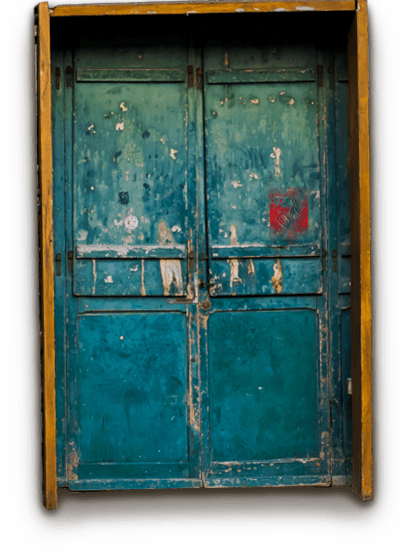
Real life escape rooms 'make sense' the moment you step foot in one.
- Is there a giant blue door? You probably need to open it.
- What about a big locked pirates chest? I bet it contains the loot.
- Sword stuck in the stone? You get the picture.
However, in a DIY escape game players are in an office doing a team building day, or a backyard for a kids party. So the overall goal isn't obvious.
Your adventurers need a quest! So, make the goal obvious when you're designing your escape room flow.
Like...
## OBVIOUS ##
#5 Destroy The Kit (really)
Printable escape room kits give you lots of options for interesting puzzles, including scrunching, cutting, throwing and folding.
This is perfect for the overly-curious goblin or that particularly clumsy barbarian in your party. There's no need to worry about breaking sensitive game pieces because you can just print it again!
So don't fear to really unleash the creativity of your adventurers, always add at least 3 puzzles that involve tactically using the kit.
Here're some ideas:
Roll into a cylinder

Cut out and Overlay
Cut out and Sort
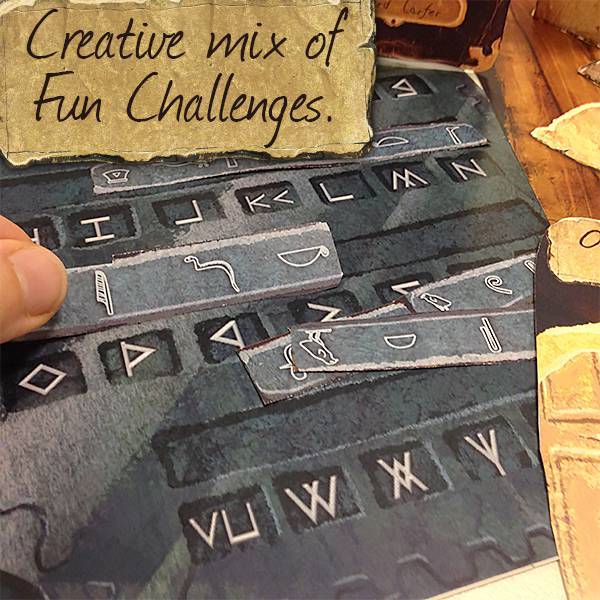
Foldable Puzzles
This puzzle, from The Lost Mummy, is one of the best from any of our escape kits because it's so hands on.
Create Origami Puzzle
This origami challenge, from Rebel Revolt, turned out to be much more challenging than expected (but fun!)
#6 Fixate on A Single Puzzle
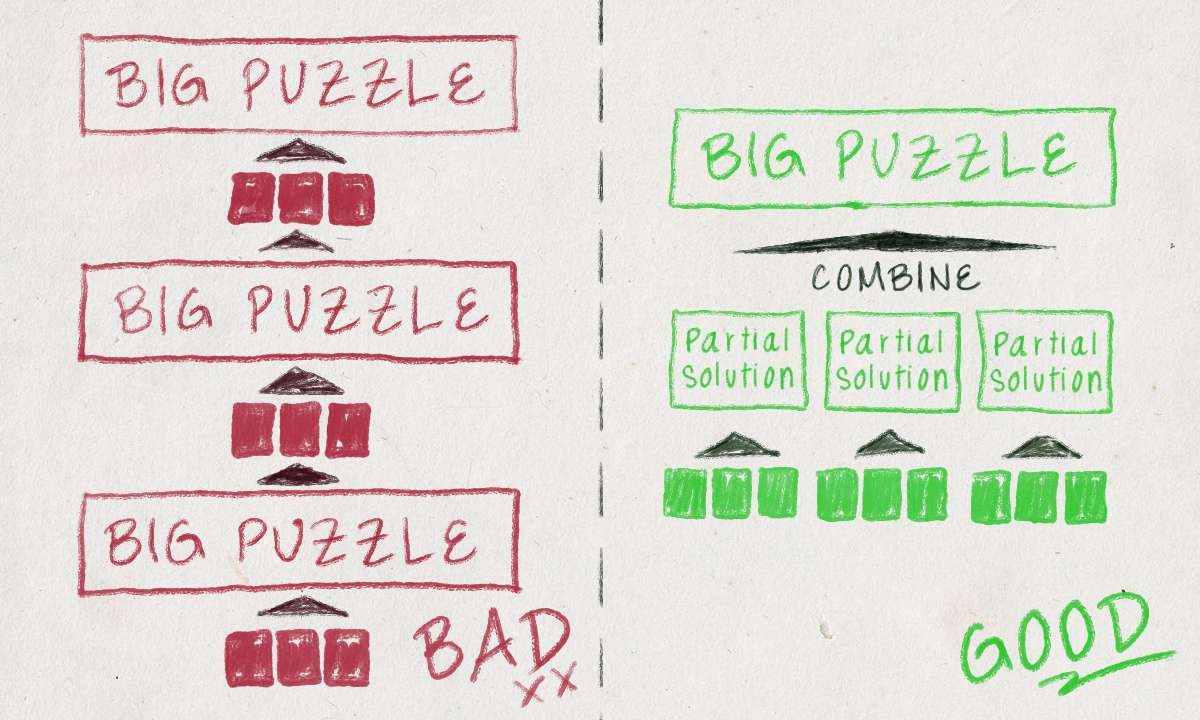
Many computer games use a 'String of Pearls' script involving many stages and changes (the red side of the picture). While it feels natural to follow this formula, unless you're making a game for kids, in a DIY escape room it will fail.
Miserably.
This is because you're (most definitely) following Secret #1 and Incinerating Checking Mechanisms. There's just no way for players to know they've 'succeeded' in this part and to move onto the next stage. (well, ok there is, but they all make the game less fun and are not worth doing just to add a morphing storyline).
Solution?
Just make the story occur in one location and have just one major goal. After all, people are playing the game to interact and have fun, not experience an interactive theatre play.
- Example of a tiresome storyline:
- Players start in a magic library.
- After casting a teleport spell they appear in a dungeon.
- Lastly, they defeat a dragon.
- A more immersive storyline would be:
- Players are stuck in a magical library and must solve several concurrent puzzle chains. These will result in a partial solution to the single big puzzle.
This doesn't change the number of puzzles in the game, rather, it shifts the flow to where players are concurrently solving multiple chains. It's surprisingly simple if you start with a high-level design before generating puzzle ideas (here's a blueprint to help with this).
Why a string of pearls storyline is ok for kids Escape Rooms
In these cases, following the String of Pearls approach makes the game less overwhelming and potentially more fun. After all, if they're ever stuck the Game Master can give them hints as well as pass them the next set of puzzles upon successfully completing each challenge.
We did this in The Lost Mummy and the game is still quite easy to set up.
Turn game design into a family activity everyone will LOVE!
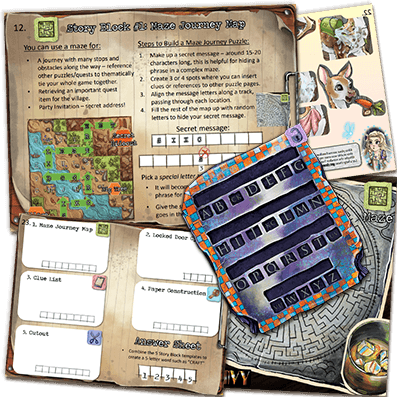
Keep it simple by downloading the Escape Room Master Class.
It comes with all the templates, puzzles, and props you need for days of family fun!
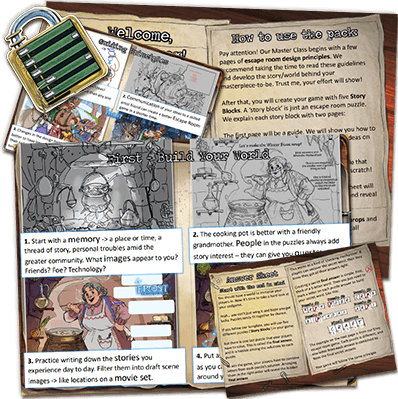
#7 Standardize puzzle Design
It's obvious you'll need a variety of puzzles in your escape room.
What's not obvious is a dreary old ghost. He hides in your room and feeds off a lack of consistency between your puzzles. Worst still, this ethereal design theory is one of the biggest fun killers in your game, and many designers don't spot him until it's too late!
Consider this inconsistency:
All clues in your escape game are only used once, except for one. Players will learn to use and discard all clues, then get stuck on the puzzle that requires something to be reused. Instead, make every clue used the same number of times.
Or this:
Each puzzle type is included as an easy version and a hard version. Such as an easy and hard cipher. When players solve the easy one they'll have learned the approach to crush the harder one. This style can work great, but if you have a hard puzzle with no warm up players will start looking for it, only to find themselves stuck and frustrated.
Build consistency into your puzzles and you won't need to call anyone, that depressing old spectre will just leave!
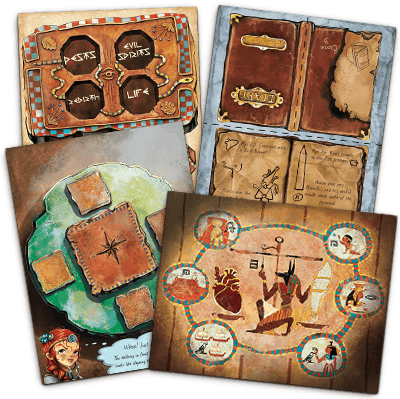
The Lost Mummy gives players clues in 4 Diaries. Every puzzle in the escape kit requires exactly one clue, and each clue is used only once.
This allows players to 'tick' the clues off as they use them and narrow down what's left towards the end of the game.
#8 Get In The Flow
The most challenging part of crafting the perfect escape room is balancing the difficulty between too boring and too hard.
If your game's too easy, it's dull and lifeless.
Too hard, and it's table-flippingly frustrating!
That sweet spot in between the two is 'Flow', and it can make or break your game.
How do you get it?
Start by understanding who you're designing your escape game for:
- Hyper competitive group of lawyers at a team building day? Make it super tough.
- Fun activity for those 3 hours of downtime at a wedding? Make it short, easy and add some laughs.
- School teacher making learning fun with an escape room? Pitch it to the age that your students are at.
The only right or wrong answer here is whether you know your goal as an escape room designer, and are hitting it.
The way you check this is testing. Lots, and lots, of testing.
(yes I saw your eyes just roll. Testing isn't sexy. Just mission critical).
The other side of creating flow is to ease players into how the game works by starting with easier puzzles. These don't have to connect to harder versions of themselves down the track, but you want players to be able to hit the ground running.
A fantastic way to achieve this is starting the game with a series of Tasks or Games (see #9 below).
Escape Room Z is up to version 30 🙁
So, updating the game is a given if you're selling it through a store like Lock Paper Scissors.
#9 Vary challenge types
Believe it or not, people don't want an escape room where they solve a linear sequence of puzzles.
They want a delightful adventure with their friends.
That's the whole idea. FUN!!!
Therefore, your goal as an escape room designer is to mix in a variety of experiences that get friends talking, laughing, and facing a challenge together.
You can include these in any ratio you like, but the suggestions below work well for keeping everyone interested. Remember, everyone finds different activities fun so keep everyone engaged by including a good mix from this list.
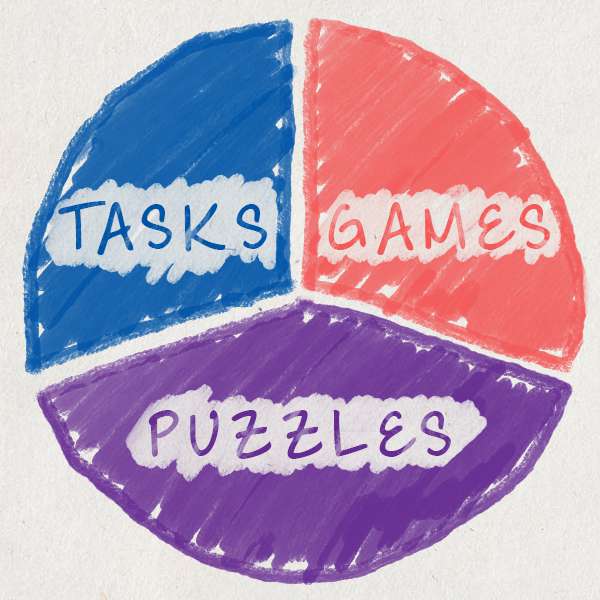
Here's a breakdown of the various activities to include in your escape room design:
- 30% Tasks: these are challenges that required Doing not Solving. For example, when players see a maze they instantly know how to complete the challenge (they just need to do it). Other great examples are alignment or folding puzzles. Tasks give players a 'quick win' where they feel like they're crushing it before they get to the harder puzzles. For example, we get players straight into the game when they piece together clue cards to make a bigger picture. This very simple task gives them an immediate 'win' feeling which spurs them on to try more rather than scratch their head at being stuck.
- 40% Puzzles: these are what you're thinking about when imagining Escape Room Puzzles. Players won't notice the distinction, but they'd be described as 'harder'. In reality, they require Solving but take almost no time to Do.
- 30% Party Games: Everyone loves party games. Jam them into your mix for ultimate fun. For example, shooting targets with a NERF gun or avoiding land mines while blindfolded. They can even be special rules that apply to the game, like 'Players can't talk until completing X'. These just require a very short description showing players how to set the game up, along with the Success Condition. Since your printable escape game is being played by kids at a party, or groups of friends, they'll suspend disbelief and not cheat. Effectively, the solution is intrinsic to the puzzle.
Reader's tip: keep things fresh by making all puzzles unique. An exception would be making one much harder and using the first to train players in solving it (thanks to Stephanie Lein for pointing this out).
#10 Cook Red Herrings
Red Herrings are those 'extras' in an escape room that exist solely to distract players.
If you're creating your own escape room business in real life, they suck.
In printable escape rooms, they're noxious infractions against the human soul.
It's because there's so little context and players are already using their imagination to craft the world.
Don't do them, lest you be swallowed whole by the mystical red herring in the sky.

A friend mistakenly placed a box in their escape room which accidentally had the numbers 3157 written on it. Of course, every time a combination lock was found, 3157 had to be annoyingly tried...
#Bonus: Add An Easter Egg
Die-hard fans of your escape room will want to suck the marrow out of every last puzzle, challenge, and game (don't worry, they're not undead, they're just passionate!).
Reward these weathered adventurers with a bonus super-hard puzzle that's totally optional.
You can do this without getting in the way of the main game by making the start of it quite obvious:
- Add a QR code to one of the puzzles, like this one from Rebel Revolt (click the image to zoom in).
- Include a hidden message in a common code type like a Pig Pen Cipher. (like on one of the images on this page).
- Add strange markings around the edges of the puzzle sheets that when combined together make a smiley face or something easy to recognize.
Anything goes really. Just make it a harder challenge for die hards to fall in love with.
(A nice bonus for players who successfully complete the bonus easter egg is to enter a competition to win a prize. For example, a free escape kit).
There's an easter egg hidden in this puzzle from Rebel Revolt. Just click the pic for a high res version.
Customize one of these magical Escape Room Kits:
Feel like playing sooner? Just grab one of these printable escape room kits. They download instantly and are ready to print & party. Tonight!
Don't worry, you can even edit the game, using PowerPoint, to add your own style and puzzles.

